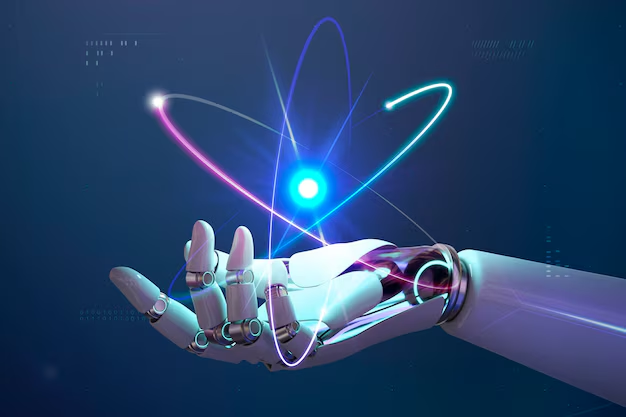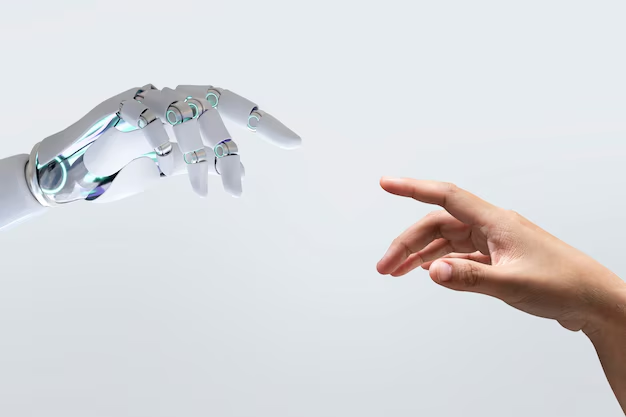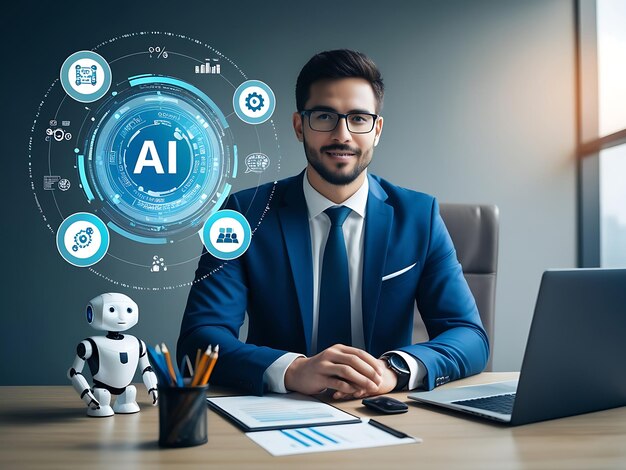
Table of Contents
Introduction
As Artificial Intelligence (AI) continues to evolve, its impact on various industries is becoming more apparent. Digital marketing, in particular, is one area where AI is making waves. From automating tasks to predicting consumer behavior, AI is fundamentally changing how businesses approach marketing strategies. The question now isn’t whether AI will play a role in digital marketing, but rather how it will shape the future of this dynamic field.
In this blog, we will explore the future of AI in digital marketing, its current applications, and how marketers can leverage AI to stay ahead.
The Current Role of AI in Digital Marketing

Before diving into the future, it’s essential to understand how AI is already transforming digital marketing today. Here are a few ways AI is currently being used:
- Automation of Repetitive Tasks: AI streamlines tasks like email campaigns, social media posting, and ad optimization, enabling marketers to focus on creative and strategic activities.
- Predictive Analytics: AI-powered tools analyze consumer behavior, making it easier for marketers to predict trends, personalize content, and target audiences more effectively.
- Chatbots and Customer Service: AI-driven chatbots provide real-time customer service, handling inquiries and providing recommendations, enhancing user experience without human intervention.
- Personalization: AI tailors marketing messages to individual users by analyzing their behaviors, preferences, and past interactions with a brand. This hyper-personalization helps businesses deliver relevant and timely content.
These applications represent just the tip of the iceberg in terms of what AI can do in the digital marketing space.
The Future of AI in Digital Marketing: A Glimpse Ahead
As AI technologies become more advanced, their role in digital marketing is expected to expand dramatically. Here’s what the future of AI in digital marketing might look like:
1. Advanced Predictive Analytics
Predictive analytics has already become a crucial tool in digital marketing. However, the future holds even more sophisticated AI models that can predict consumer behavior with greater accuracy. These AI models will analyze a broader range of factors, including social media trends, economic shifts, and even emotional states, allowing marketers to create hyper-targeted campaigns.
Imagine a scenario where AI can predict the exact moment a customer is most likely to make a purchase or when they’re considering switching to a competitor. Marketers can then take preemptive action by offering personalized incentives to retain their customers.
2. AI-Generated Content
While AI-generated content is still in its infancy, the future may bring more advanced AI systems capable of creating high-quality, long-form content that resonates with audiences. Tools like GPT-4 (and future iterations) already generate human-like text, but future systems will be able to craft entire marketing campaigns, including blog posts, social media content, and even video scripts.
However, AI content will not completely replace human writers and marketers. Instead, AI will serve as a tool to assist in content creation, helping marketers scale their efforts while maintaining creativity and authenticity.
3. Voice Search Optimization
Voice search is on the rise, thanks to AI-driven voice assistants like Amazon’s Alexa and Google Assistant. The future of digital marketing will likely revolve around optimizing content for voice search. AI will help marketers understand how people phrase their voice queries differently from typed searches, allowing for more targeted SEO strategies.
Marketers will need to focus on natural language processing (NLP) to ensure that their content is easily discoverable via voice search. This shift will make AI indispensable in crafting conversational marketing strategies that resonate with voice search users.
4. Visual and Video Recognition
AI’s capabilities in image and video recognition are expected to improve significantly in the future. This will allow digital marketers to analyze visual content more effectively, optimizing campaigns with dynamic visuals that engage users.
Platforms like Instagram and Pinterest will benefit from AI’s ability to analyze user interactions with visual content, enabling marketers to create more targeted, visually appealing advertisements. AI can also help track user engagement with video content, providing insights into what works and what doesn’t.
5. Hyper-Personalized Customer Experiences
Personalization will become even more precise with AI’s ability to process vast amounts of data in real-time. Marketers will be able to create a seamless, hyper-personalized customer journey. From personalized website experiences to real-time product recommendations, AI will ensure that each interaction a user has with a brand is tailored to their preferences.
This hyper-personalization will extend beyond just content. Future AI systems could tailor entire customer experiences, including website navigation, purchase flows, and product discovery, based on individual behaviors and needs.
6. AI-Driven Paid Advertising
The future of digital advertising will see more AI-driven platforms handling the creation, targeting, and optimization of ads. While platforms like Google and Facebook already use AI for ad targeting, future developments will allow AI to autonomously run ad campaigns, optimizing bids and ad placements in real-time.
Marketers will benefit from reduced costs and more effective campaigns, as AI will analyze countless data points to deliver the right message to the right audience at the perfect moment.
7. AI-Powered Customer Segmentation

Segmenting customers based on demographic or behavioral data is a fundamental part of digital marketing. In the future, AI will take this a step further by creating highly granular customer segments that account for more complex behaviors and preferences. AI will identify patterns that are invisible to the human eye, providing marketers with the ability to target ultra-specific customer segments.
These advanced segmentation capabilities will enable marketers to create more personalized campaigns and maximize engagement, increasing conversion rates across the board.
8. Emotionally Intelligent AI
One of the more intriguing developments in AI is the potential for emotionally intelligent AI. These systems will be capable of reading and interpreting human emotions based on text, voice, and visual cues. Future digital marketing strategies could use emotionally intelligent AI to adjust messaging and tone based on the emotional state of the consumer, creating deeper and more meaningful connections.
Emotionally intelligent AI could revolutionize customer service, as well, with chatbots and virtual assistants providing more empathetic and nuanced responses to customer inquiries.
Challenges of AI in Digital Marketing
Despite the exciting possibilities, there are challenges associated with integrating AI into digital marketing.
- Data Privacy Concerns: As AI requires vast amounts of data to function, concerns over data privacy and security are likely to grow. Marketers will need to strike a balance between leveraging AI and respecting consumer privacy, especially as regulations like GDPR continue to evolve.
- Dependence on Algorithms: Relying too heavily on AI algorithms could stifle creativity. Marketers must ensure that AI serves as an aid, not a replacement, for human intuition and creative thinking.
- Cost and Accessibility: For smaller businesses, the cost of AI tools and technologies may be a barrier. As AI becomes more mainstream, we can expect to see more affordable options, but it’s important to recognize that early adopters may face higher costs.
How Marketers Can Prepare for an AI-Driven Future
To stay competitive, digital marketers must start embracing AI technologies now. Here’s how:
- Invest in AI Tools: Explore AI-driven tools for analytics, automation, and content creation. Many AI tools are available to streamline tasks and make data-driven decisions.
- Focus on Creativity: AI may handle the data, but creativity will remain essential. Marketers should focus on creative strategies that AI cannot replicate.
- Stay Educated: As AI continues to evolve, marketers must stay informed about new developments and learn how to implement AI technologies in their strategies.
Conclusion: AI and the Future of Digital Marketing
The future of digital marketing is undeniably intertwined with AI. While AI will automate and enhance many aspects of marketing, the human element—creativity, empathy, and strategic thinking—will remain invaluable. Businesses that learn to integrate AI into their marketing strategies will stay ahead of the curve, delivering more personalized, efficient, and impactful marketing campaigns.

Add a Comment